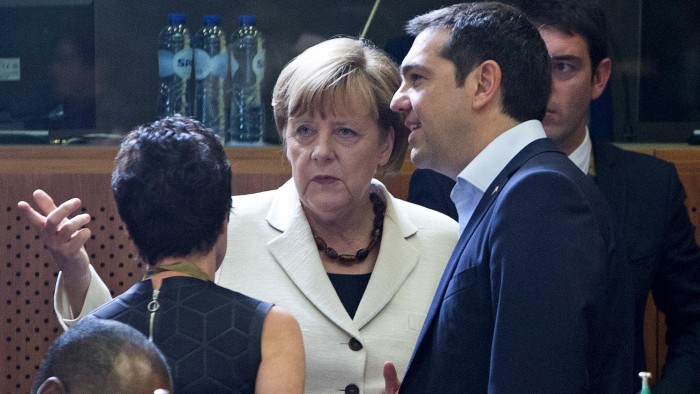Greece is Europe’s failed state in waiting


Roula Khalaf, Editor of the FT, selects her favourite stories in this weekly newsletter.
When, as now appears likely, Greece financially separates from Europe it will at one level be no one’s fault.
The Greek leaders will rightly explain that having imposed more austerity on themselves than any industrialised country has suffered since the Depression, they could not have done more without light at the end of tunnel in the form of a clear commitment to debt relief. European leaders will rightly explain that they adjusted their positions repeatedly to accommodate the Greeks. They will stress that their citizens would not permit Greece to play by different rules to the rest of Europe. And the IMF will rightly explain that it would have blessed any plan agreed by Greece and Europe that added up.
The trouble is that all the parties are going to get much more of what they fear from a breakdown than they would even from what they regard as an unacceptable compromise. Historians understand how the first world war was allowed to start but are still, a century later, incredulous that it happened. Financial historians may look back at the events of next week and wonder how Europe’s financial unravelling was permitted.
Make no mistake about the consequence of a breakdown. With an end to European support and consequent bank closures and credit problems, austerity in Greece will get far worse than it is today and it will probably become a failed state to the great detriment of all its people and their leadership.
When Greece fails as a state, Europe will collect far less debt than it would with an orderly debt restructuring. And a massive northern out-migration of Greeks will strain national budgets throughout Europe — not to mention the challenges that will, come as Russia achieves a presence in Greece.
The IMF is looking at by far the largest non-payment by a borrower in its history. True, there are good reasons to think enough foam has been placed on the runway to prevent financial contagion. Yet, this was asserted with respect to LTCM, subprime and the fall of Lehman.
Diplomacy fails and catastrophes happen when nations are preoccupied with their own concerns and fail to consider the political needs of their counterparts and become convinced that their counterparts will not take yes for an answer.
Here is an informed outsider’s judgment as to what needs to happen if disaster is to be averted.
What happens if Greece defaults?

Is Greece about to default on its debts and if so, what happens next? Gideon Rachman and his guests Tony Barber and Martin Sandbu discuss what has gone wrong between Greece and its eurozone creditors and whether the political rifts can be repaired.
The Greek prime minister Alexis Tsipras needs to do what is necessary to make reaching an agreement politically feasible for his fellow Europeans.
That means dropping ideological rhetoric about a new European approach. He must recognise that Greece’s problems are significantly of its own making and make clear that he is absolutely committed to doing what is necessary to keep Greece in the euro area. He needs to be clear that he will accept further VAT and pension reforms to achieve primary surplus targets this year and next, but that he expects a clear recognition that if Greece does its part, debt will be written off on a large scale.
German chancellor Angela Merkel and the European authorities must do what is necessary to make policy adjustments politically tenable in Greece.
That means acknowledging that the vast majority of the financial support given to Greece has gone to pay back banks rather than to support the Greek budget. They must agree on debt relief and recognise the degree of adjustment in Greek spending that has taken place: with nearly 30 per cent of government workers laid off. It also means announcing their intention to accelerate economic growth throughout Europe.
The IMF needs to recognise that this is now not about the numbers. It is about the high politics of Europe. Its job is to stand behind any deal that avoids breakdown.
The hour is late. But it’s often darkest before dawn. Let us all hope that Greece and Germany use this weekend to work back from the brink before Monday’s summit.
The writer is Charles W Eliot university professor at Harvard and a former US Treasury secretary.
Comments